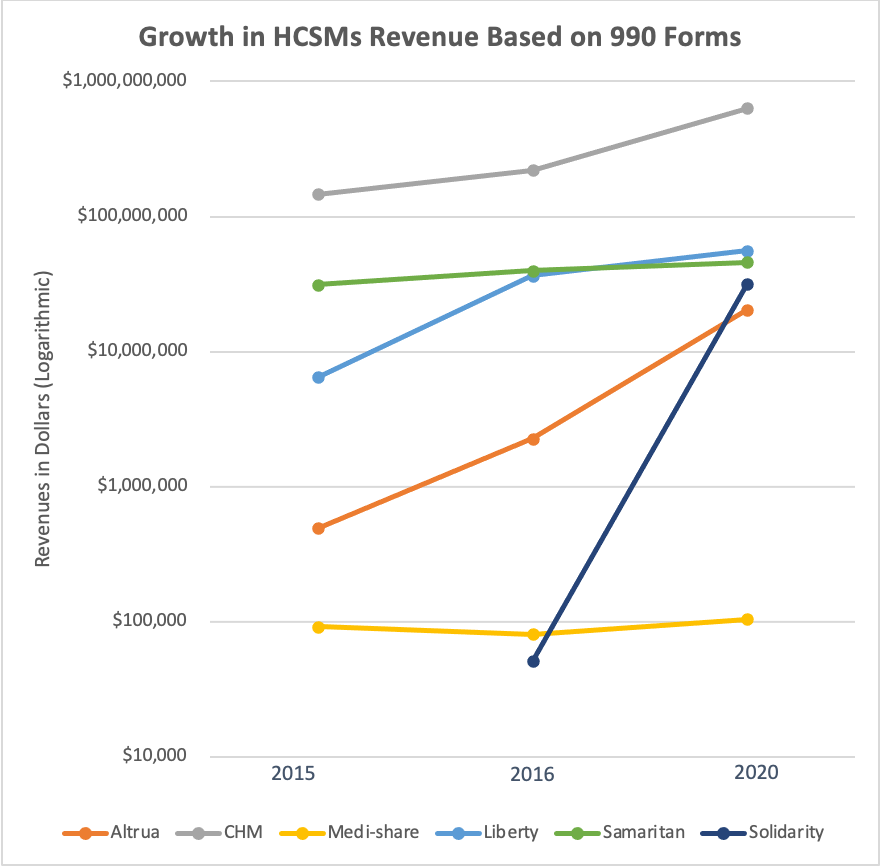[ad_1]

By Nadia Stovicek and JoAnn Volk
A recent study from the Authorities Accountability Workplace (GAO) sheds new gentle on health care sharing ministries (HCSMs). The GAO interviewed officers from 5 HCSMs on plan options, enrollment, and advertising. The report consists of, for instance, details about HCSM use of paid gross sales representatives, administrative prices (one HCSM directs as much as 40 p.c of members’ contributions to administrative prices) and membership (one HCSM mentioned a survey of their members discovered 42 p.c had earnings beneath 200 p.c of the poverty degree, which might make them eligible for substantial subsidies for a Market plan). However the report affords solely a snapshot of a handful of HCSMs.
Regardless of a history of fraud and unpaid bills, HCSMs are largely a black field for insurance coverage regulators and most people. Trinity, an HCSM administered by the corporate Aliera, recently went bankrupt; at the least 14 states have taken motion to close down Aliera due to their malfeasance. Members suing Aliera are solely anticipated to recoup one to five percent of the cash they’re owed, which might quantity to a whole lot of 1000’s of {dollars}. Extra just lately, the North Dakota Lawyer Common settled a lawsuit with HCSM Jericho Share for creating “a misunderstanding that its merchandise are medical insurance” and utilizing that misunderstanding to promote memberships. Past the information within the GAO report, little is understood concerning the operations or funds of HCSMs. A shopper contemplating changing into a member of a well being care sharing ministry—with an expectation that their well being care payments will likely be paid—might wish to know, for instance, if the HCSM has a historical past of steady income or retains in reserve sufficient funds to cowl members’ well being care payments. To raised perceive what data is on the market, we reviewed publicly accessible audits and income studies to the IRS to see what data an bold shopper might get hold of about an HCSM earlier than enrolling.
What are HCSMs?
HCSMs’ members conform to observe a typical set of spiritual or moral beliefs and contribute common funds to assist pay the qualifying medical bills of different members. HCSMs have many features which might be much like these of insurance coverage. For instance, members’ funds are usually required on a month-to-month foundation and should differ relying on age and degree of protection, very similar to a premium. Members should pay some prices out-of-pocket earlier than they’ll submit payments to the HCSM for fee, akin to a deductible; member tips for protection typically require members to pay co-insurance and use a community supplier when getting care. Even the marketing depends closely on the similarity to insurance, which might mislead shoppers into pondering they’re getting extra from a membership than an HCSM offers.
Regardless of these similarities, most states don’t think about HCSMs to be medical insurance issuers, and don’t topic them to the requirements that insurance coverage firms should meet. This could go away members financially weak. HCSMs make no assure that they may cowl any well being care declare, even people who meet tips for sharing, they usually don’t have to fulfill monetary requirements to make sure they’ve sufficient funds to pay claims. In addition they should not have to adjust to the patron protections of the Reasonably priced Care Act (ACA). For instance, HCSMs should not have to cowl essential health benefits, which embrace hospitalization, maternity care, psychological well being and substance use dysfunction companies, prescribed drugs, and preventative companies. In reality, HCSMs usually exclude coverage for preexisting situations, behavioral well being, and maternity care besides in restricted circumstances, and restrict protection for prescribed drugs.
What knowledge is publicly accessible?
State regulators need data to grasp how HCSMs function and market memberships to shoppers, however most states don’t accumulate such data. Solely Colorado requires knowledge from all HCSMs promoting memberships in-state; Massachusetts collects data from these HCSMs whose members can declare credit score for protection beneath the state’s particular person protection requirement. The federal authorities doesn’t accumulate or present to the general public actionable knowledge about HCSMs both.
Nonetheless, some states require HCSMs that search an exemption from state insurance coverage necessities to make accessible an annual audit upon request. The ACA definition of HCSMs whose members are exempt from the person mandate additionally consists of that requirement. Primarily based on these annual audit reporting necessities, we contacted seven HCSMs, representing the most important HCSMs working throughout states to request a duplicate of their annual audit: Altrua, Christian Healthcare Ministries (CHM), Medi-share, Samaritan, Sedera Well being, Solidarity, and Liberty HealthShare.
These audits are usually carried out by an accounting agency and supply an summary of the monetary solvency of a company, together with statements of economic positions, actions, purposeful bills, and money flows. Of the 7 HCSMs we contacted, solely 3 offered us with an audit when requested. (See Desk 1.) One HCSM, Medi-Share, solely offered a brief document with extra restricted knowledge than could be required in an official audit.
Desk 1.
| HSCM | Audit offered? |
| Altrua | No |
| Christian Healthcare Ministries | Yes |
| Medi-Share Christian Care Ministry | No |
| Samaritan Ministries | Yes |
| Sedera Well being | No |
| Solidarity HealthShare | No |
| Liberty HealthShare | Yes |
Supply: Authors’ communication with the listed ministries
As a result of we have been unable to acquire an annual audit from all seven HCSMs, we additionally reviewed their publicly accessible 990 varieties to research monetary knowledge. Non-profit organizations should yearly file a Form 990 with the Inside Income Service (IRS). With this kind, non-profits report required knowledge on the group’s actions, funds, governance, and compensation paid to sure staff and people in management positions. We obtained a number of years of 990 varieties by way of ProPublica, a information web site, and the IRS web site for the entire HCSMs we reviewed besides Sedera. It’s unclear why Sedera, which claims to be a non-profit on its web site, wouldn’t have submitted a 990. As a result of the IRS has not but printed 2021-2022 990s, we couldn’t evaluation the latest knowledge.
What the Information Reveal
Audits, the place accessible, present higher element than a 990. For instance, audits present data on “purposeful bills,” which embrace spending on public relations, worker advantages and taxes, amongst different bills. Two audits additionally reported loans obtained beneath the Paycheck Protection Program: $3 million to Liberty HealthShare and $2.5 million to Christian Healthcare Ministries, each of which have been forgiven.
However audit knowledge aren’t reported in a constant means. For instance, Samaritan Ministries and Christian Healthcare Ministries checklist members’ presents and dues as income; Liberty HealthShare doesn’t depend member contributions as income as a result of they’re held in members’ sharing accounts, which aren’t mirrored within the audit. In one other instance, Samaritan Ministries studies spending on promoting, Christian Healthcare Ministries studies spending on “member improvement charges,” which is claimed to mirror spending on promoting, and Liberty HealthShare studies “member improvement charges” and “promoting” prices individually, which suggests member improvement charges might embrace commissions to brokers. HCSMs that pay dealer commissions typically pay substantially higher commissions than these paid to brokers who enroll individuals in ACA protection, which might drive higher enrollment.
As a result of we have been capable of get hold of a number of years of 990s, we have been capable of examine income adjustments over time. HCSMs report whole income on 990s primarily based on contributions, program companies, or each. The 990s lack element however it’s doubtless the income at the least roughly displays rising membership. Most HCSMs’ 990s that we reviewed noticed enormous income progress between the years we might evaluation. (See Graph 1). For instance, Solidarity HealthShare’s reported income grew a whopping 62,143% in 4 years, and Altrua grew about 4,010% in 5 years. Medi-Share was a notable exception to this development; it reported little or no income and progress between 2011 and 2020. It’s not clear why, as Medi-Share is among the oldest and largest HCSMs within the nation.
Graph 1.

Supply: authors’ evaluation of 990 filings
A majority of the HCSM 990 varieties we reviewed (Solidarity, Samaritan, Christian Healthcare Ministries, Medi-share, and Altrua) indicated spending in extra of revenues in some years and substantial income fluctuations year-to-year. This raises questions concerning the adequacy and stability of funding accessible to cowl members’ well being care prices. One HCSM, Liberty HealthShare, has come beneath current scrutiny for his or her historical past of not paying their members’ claims.
One problem with the information accessible on the 990s is that every HCSM studies its knowledge otherwise, making it troublesome to make comparisons between them. In distinction, well being insurers should use a standardized template to report monetary knowledge to state regulators, making it doable to grasp and examine insurers primarily based on premium income, accessible reserves, and bills paid for administrative prices and members’ well being care claims.
Conclusion
The dramatic progress in income for almost all of HCSMs we checked out suggests substantial progress in enrollment. Nonetheless, the numerous income fluctuations from year-to-year, coupled with some HCSMs exhibiting bills that exceed revenues, increase questions on whether or not shoppers who select an HCSM as an alternative choice to complete protection can depend on their well being care payments getting paid. Regulators searching for to grasp the rising function of HCSMs of their markets—and the dangers to shoppers who’re persuaded, typically by deceptive advertising, to purchase memberships—want extra full knowledge reported regularly. Guaranteeing HCSMs adjust to the requirement to make accessible an annual audit is a spot to start out in states the place that applies, however even that knowledge is restricted and all states ought to have an curiosity in acquiring extra full knowledge to raised perceive this rising phase of protection.
[ad_2]



